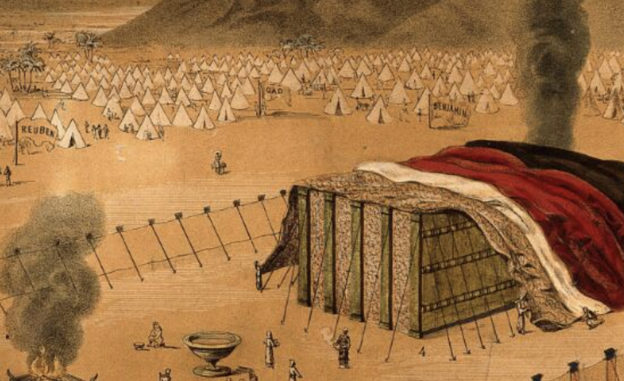Have you ever seen someone famous visit your town, your work, or your school? Perhaps you lined the roads and watched as the Queen drove by on one of her royal tours (back when she was able to do them). Depending on how important that famous person was, or how much you care about the Queen, that may have been a very important day to remember.
For the Israelites, as we reach the end of Exodus, a similar famous day was arriving. After bringing Israel out of Egypt, establishing a covenant relationship, and issuing instructions for the building of God’s tabernacle, all that remained was to pitch the tents and await the Great King’s arrival, to lead them in his glory to the Promised Land.
One year to the day after God led the Israelites out of Egypt, God instructed Moses to “erect the tabernacle of the tent of meeting” (vv.1-2). God’s miraculous rescue of Israel was so important that the date became the start of their new year, and on the first anniversary they were to erect God’s dwelling-place to receive him.
God told Moses how to put together the tabernacle, and where to place all the furniture and equipment, from inside the Most Holy Place in the tabernacle to the outside (vv.3-8). It was just as important that everything they had prepared, having passed the quality assurance tests of the previous chapter, were arranged as God intended.
The next step was to formally set the tabernacle and everything associated with it apart for God’s service. This was firstly achieved by anointing the tabernacle and the altar, lampstand, and everything else with anointing oil (vv.9-11).
But it was not just inanimate objects which were set apart for serving God. Aaron and his sons were also consecrated to God’s service, along with the special garments they wore. So Moses was to wash Aaron and his sons with water (symbolising the washing away of sins, just as the dirt was removed), and then anoint them and their garments with oil (vv.12-15).
As God commanded, “Moses did; according to all that the Lord commanded him” (v.16). Moses carefully erected the tabernacle, and working his way from the inside out, moved in and set up all the furniture (vv.17-33). He, Aaron, and his sons washed themselves in the basin, and all the items were anointed as God commanded.
Moses finished his work, just as God commanded. The tent was erected, the table set, the lighting adjusted, and everything was just so. All that remained was for God’s Glory to come down.
Once Moses stepped away from the last of his setup tasks, “the cloud covered the tent of meeting, and the glory of the Lord filled the tabernacle” (v.34). A visual manifestation of God appeared among God’s people. God had always been with them in a sense, since God transcends time and space; he is everywhere (1 Kings 8:27). But in that moment, God’s glory became immanent, became gloriously near, to the Israelites, a divine radiance among them.
The glory was so much that nobody could enter the tent, not even Moses the mediator (v.35). That would have to wait for later, once the sins of Moses and Aaron were atoned for (cf. Leviticus).
But despite the incredible radiance of God’s glory and the distance still between God and the People, God was there to stay. When the glory cloud lifted from the tabernacle, the people followed God’s lead and moved where he moved (v.36). Where God stayed, when God stayed, the Israelites stayed (v.37). God’s presence was with the Israelites, as a cloud by day and fire by night, wherever they went (v.38).
Like then, God wishes to participate in our lives and lead us in the ways of righteousness. God is not an absent deity, distant from us, but just as far greater than us is still close to us, revealed to us by his son Jesus Christ who is the greater dwelling-place of God with us.
But this passage reminds us that, for all the good things Moses and Israel did, access to God was still restricted when God’s glory came down. Moses and Aaron, let alone Israel, could not enter God’s presence without atonement for their sins. They needed a redeemer.
Christ had to come to bring the fullness of God’s glory to us, and to provide the atonement necessary for us to enjoy the intimacy of God’s presence. Christ is the redeemer who atones for our sins, so we can enter into God’s presence and enjoy close fellowship with him.
We like the Israelites have been redeemed from slavery to sin, brought out of captivity, and now are bound for the Promised Land of Heaven. As we go to the Promised Land we enjoy the presence of God with us; Christ’s presence abiding with us through the Holy Spirit, until the day we walk through the “Pearly Gates”, every tear is wiped from our eye, and we enjoy the fullness of glory in God’s presence forevermore.


